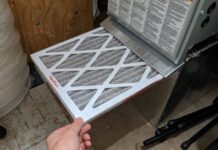Sleep expert and professional interior designer Jennifer Adams is back to answer your questions and provide some helpful advice! Today we consider the important topic of how to isolate and address that hidden “funk” that may have taken up residence in your home:

Do You Smell Something?
Ever been taken aback with this question when someone new enters your home for the first time? Perhaps it was spoken in all innocence, but it still doesn’t feel all that innocent when The Question falls on your ears:
“Hey, do you smell something in here?”
“No, why?”
“Oh, maybe it’s nothing then … well, isn’t THIS is a nice collection of souvenirs tea spoons you have here. I had no idea you’d been to Prague!”
Nice change of subject there, but they wouldn’t have asked the question if they didn’t smell SOMETHING. What are they smelling? Why can’t I smell it? Is my smeller broken? No, I can smell fine, thank you very much! I’m not the one with the problem, YOU’RE the one with the problem!
If none of these techniques are working to get rid of the smelly drains, contact a sewer repair professional and schedule a CCTV sewer inspection to uncover the cause of the problem.
See also: How to Identify Bed Bugs and How to Get Rid of Them?
Why Can’t I Smell It?
Ok, let’s take a break and just chill before this thing escalates any further. Your smeller may actually be working just fine, but over time some scents can become masked to your senses. Let me explain. Your home most certainly has a particular scent or blend of scents – all homes do.
If you’re unable to detect a certain individual scent in your home, you may be experiencing something known as “olfactory fatigue.” This doesn’t mean that your nose has necessarily gotten tired, it just means that your smeller may have become numb to certain nuances of smell over time.
Your drains play a significant role in keeping your home in order. When you take a shower, all that dirt, soap, and pieces of your hair go down the bathroom drain. Giving this vital part of your house a regular professional deep drain cleaning can prevent it from having issues such as blockages or pipe degradation.
Breaking Down Olfactory Fatigue
Olfactory fatigue happens all the time, and sometimes it can even happen fairly quickly. For example, have you ever shopped in a store with many varieties of strong scents, like perfume or scented candles? You can smell two or three, but before long it’s hard to tell the difference between any of them. They all just seem to run together, and it’s as if the individual scents have disappeared!
The unique scent blend inside each of our homes features a combination of all the scented products we use on ourselves and in our home, but it also involves so much more. It also includes your furniture, bedding, decorative pillows, body oil, sweat deposits, all of your possessions, dust, dander from people and pets, cooking odors that linger, and even the very materials of which our homes are constructed. This is one reason why I shop for low or no-VOC materials whenever possible. but that’s a topic for a whole different column some other time.
See also: 5 Signs It’s Time to Change Your Furnace Air Filter
The Funk You Didn’t Know You Had
Odd, or even bad odors can grow in your home over time, starting out as something subtle which gradually getting stronger. But because people acclimate to odors, it’s possible for someone to be effectively unfazed by a strong odor that would otherwise offend most visitors! Certain air fresheners and scented candles only serve to mask the odor; others may actually help clean the air, but they still won’t eliminate the source.
Time to Root Out That Funk
Sometimes it’s best to hear it from a friend. To help find the source of the smell in your house, bring in a trusted confidante who can be brutally honest, and who also has a strong sense of smell. You could also opt to choose a more objective, scientific approach – bring in an air quality expert who can take samples of the air inside your home and analyze it.
Some More Things You Can Try
If you’re determined to get to the bottom of this yourself, consider the airflow of your house. Odors rise from bottom to top, and they tend to travel along with the prevalent interior air currents. While there are more scientific ways to measure, a simple thing you can try is to light a match or spray perfume in one room and see if your friend can smell it in another. With this trial-and-error approach, you might be able to uncover the root causes of a particular odor. It may end up being something as simple as some linens or sheet sets that it’s just time to replace!
Don’t Let That Funk Sabotage Your Home
I hope these tips for finding that lurking funk are helpful! I’d love to hear what things work for you in your journey of olfactory discovery. With a little luck and a little persistence, you can have your home smell great again in no time!






















